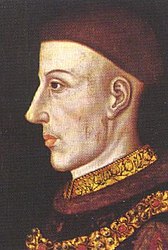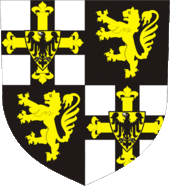1413
Portal history | Portal Biographies | Current events | Annual calendar
◄ |
14th century |
15th century
| 16th century
| ►
◄ |
1380s |
1390s |
1400s |
1410s
| 1420s
| 1430s
| 1440s
| ►
◄◄ |
◄ |
1409 |
1410 |
1411 |
1412 |
1413
| 1414
| 1415
| 1416
| 1417
| ►
| ►►
| 1413 | |
|---|---|
|
Henry V becomes King of England . |
Michele Steno , Doge of Venice , dies. |
| 1413 in other calendars | |
| Armenian calendar | 861/862 (turn of the year July) |
| Ethiopian calendar | 1405/06 |
| Aztec calendar | 11. Feuerstein - Matlactli ozce Tecpatl (until the end of January / beginning of February: 10th tubes - Matlactli Acatl ) |
| Buddhist calendar | 1956/57 (southern Buddhism); 1955/56 (alternative calculation according to Buddhas Parinirvana ) |
| Chinese calendar | 68th (69th) cycle
Year of the Water Snake癸巳 ( at the beginning of the year Water Dragon 壬辰) |
| Chula Sakarat (Siam, Myanmar) / Dai calendar (Vietnam) | 775/776 (turn of the year April) |
| Iranian calendar | 791/792 |
| Islamic calendar | 815/816 (turn of the year 2/3 April) |
| Jewish calendar | 5173/74 (August 27-28) |
| Coptic calendar | 1129/30 |
| Malayalam calendar | 588/589 |
| Seleucid era | Babylon: 1723/24 (turn of the year April)
Syria: 1724/25 (turn of the year October) |
| Spanish era | 1451 |
| Vikram Sambat (Nepalese Calendar) | 1469/70 (turn of the year April) |
Events
Politics and world events
England
The English King Henry IV dies on March 20 in the Jerusalem room of the abbot of Westminster's house, presumably of leprosy . His successor is his son Heinrich V , after he was reconciled with his father shortly before his death. Immediately after taking office, Heinrich embarked on a policy of reconciliation that was primarily intended to remove the rifts in English society and in the nobility that his father's seizure of power had opened up . Richard II is rehabilitated in his memory as a former king and buried in Westminster Abbey. The aristocratic families York , Mortimer, Percy and Holland , who have repeatedly revolted against the rule of the Lancasters and have therefore been expropriated, Henry V reinstates their rights.
France
- January 30th : Assembly of the French imperial estates of the Langues d'oïl . A requested tax collection is rejected and reforms are called for, which the government promises.
- April 7th to August 2nd : A guild revolt breaks out in Paris under the leadership of an animal skinner named Simon Caboche . Royal palaces are looted and unpopular officials are executed. The uprising is part of the Armagnacs and Bourguignons civil war .
- July 28th : The Treaty of Pontoise between Johann Ohnefurcht , Duke of Burgundy , and Duke Johann von Berry , is supposed to end the revolt of the Cabochiens .
Holy Roman Empire
- May 22nd : One day before the planned wedding of the Bavarian heir to the throne Ludwig with Catherine d'Alençon in Paris , the royal residence is stormed by armed insurgents . Ludwig, some courtiers and a number of ladies-in-waiting, a total of twenty men and fifteen women, were captured by them and only released on August 4th .
- May 24th : Ludwig I succeeds his late father Hermann II as Landgrave of Hesse . Under him, the disputes with the Archbishops of Mainz continue over disputed areas that began under his father.
- June 21 : After the death of Swantibor III. his sons Otto II and Casimir V take over the rule of the Duchy of Pomerania-Stettin together. The fighting with the burgrave Friedrich VI, who was appointed as administrator of the Mark Brandenburg . from Nuremberg to the Mittelmark go further.
- September 25 : Ludwig VII follows his late father Stephan III. as Duke of Bavaria-Ingolstadt . At the beginning of October, as planned in May, he married the French lady-in-waiting Catherine d'Alençon .
- The Braunschweiger Pfaffenkrieg begins.
German Order / Poland-Lithuania
- September: After he found it increasingly difficult to meet the financial obligations of the Teutonic Order under the Peace of Thorn and the attitude of the Polish King Władysław II Jagiełło became more and more threatening, Grand Master Heinrich von Plauen decided against the will of most of the dignitaries of the Order to War . The plan to carry out a surprise attack against Poland fails, however, as the Order Marshal Michael Küchmeister in particular thwarted the Grand Master's intentions and ordered the army to withdraw. Thereupon Heinrich von Plauen calls the Prussian general chapter to Marienburg on October 14th to have the marshal recalled. But he, well prepared, turns the tables with the help of the authorities and instead lets the Grand Master drop through the chapter.
- October 2 : Władysław II. Jagiełło , King of Poland , and Grand Duke Vytautas of Lithuania form the Horodło Union , which connects the Kingdom of Poland and the Grand Duchy of Lithuania more closely and at the same time gives the Catholic Church in Lithuania and the Lithuanian lesser nobility certain privileges . It complements previous agreements such as the Union of Krewo and Union of Vilnius and Radom . This deepens the dynastic alliance between the two states and creates the basis for the supremacy of the Polish-Lithuanian element in the future multi-ethnic state.
Ottoman Empire
- A decisive battle ensues between the two remaining sons of Sultan Bayezid I , who was defeated by Timur in 1402 and taken prisoner . Mehmed decisively defeats Musa near Çamurlu in what is now Bulgaria, with the latter killing. Mehmed I then becomes the first sultan over the entire Ottoman Empire for eleven years, thereby ending the Ottoman Interregnum .
Scotland
- August 28th : The University of St Andrews, established between 1410 and 1413, is officially founded in St Andrews by a papal bull . It is the oldest university in Scotland and is consistently one of the top three universities in the United Kingdom behind the two British Oxbridge universities (the oldest universities in the English-speaking world) .
economy
- A wisdom of the mountain court regulates the rights of the Reichsabbey Kornelimünster in relation to the salvage of mineral resources in the Münsterländchen .
religion
- Jan Hus directs his reform writing “ De ecclesia ” (About the Church) against the secularization of the traditional church.
- The forced disputation in Tortosa in the Principality of Catalonia of the Crown of Aragón on the true content of the Jewish religion begins on the initiative of antipope Benedict XIII.
Born
Date of birth saved
- February 21 : Ludwig , Duke of Savoy († 1465 )
- August 24 : Borso d'Este , Italian Duke of Modena († 1471 )
- September 8 : Catherine of Bologna , Italian Catholic mystic († 1463 )
- November 19 : Friedrich II. , Elector and Margrave of Brandenburg († 1471 )
Exact date of birth unknown
- Giosafat Barbaro , Venetian merchant († 1494 )
- Sayyed Zahiruddin Mar'ashi , Iranian scholar († 1488 )
- Aldo Marinelli , Italian poet († 1451 )
- Ulrich V , Count of Württemberg-Stuttgart († 1480 )
Born around 1413
- Marco Barbarigo , 73rd Doge of Venice († 1486 )
- John Talbot, 2nd Earl of Shrewsbury , English nobleman († 1460 )
Died
Date of death secured
- January 25 : Maud Ufford , English noblewoman (* around 1345 )
- March 20 : Henry IV , King of England and founder of the House of Lancaster (* 1367 )
- April 1 : Agnes von Oppeln , Roman-German queen (* 1360 )
- May 24 : Hermann II , co-regent and later Landgrave of Hesse (* 1341 )
- June 21 : Swantibor III. , Duke of Pomerania-Stettin (* around 1351 )
- September 25 : Stephan III. , Duke of Bavaria-Ingolstadt (* around 1337 )
- October 2 : Andrea Vanni , Senese painter and politician of the Republic of Siena (* around 1332 )
- December 26th : Michele Steno , Doge of Venice (* around 1331 )
Exact date of death unknown
- Bernat Metge , Catalan author and poet
- Werner von Tettingen , knight and major of the Teutonic Order (* around 1337 )
- Niklaus Vintler , merchant and chief magistrate in Tyrol (* around 1345 )
- David I. , Neguse Negest (emperor) of Ethiopia (* around 1350 )
Died around 1413
- 1413 or 1418 : Nicolas Flamel , Jewish-French alchemist, author and copyist (* around 1330 / 40 )




